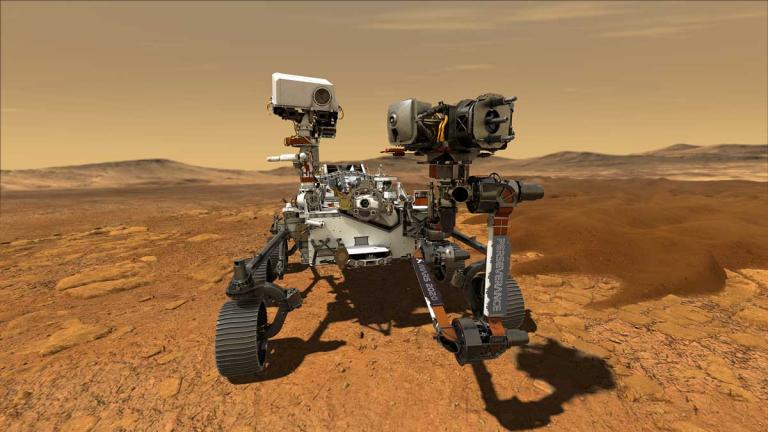Yesterday, NASA landed a new robotic vehicle on Mars, called Perseverance Rover. Its sole purpose will be to explore Mars to discover if it has life or ever had life on this red planet. This will be man’s first attempt to do this to another planet or moon in the heavens. Scientists believe water likely is necessary to sustain life. Mars provides sufficient evidence that it had water on its surface in the past, but no longer.
I am doubtful that Mars or any planet in the universe has life as we know it. In taking this position, I realize that it mathematically is extremely dubious. With all of the billions and billions of planets in the universe, since earth has life, one would expect that there must be other planets that have life. And that is the thinking of just about all scientists. Why am I willing to take this seemingly crazy notion that terrestrial life only exists on planet earth?
It’s because of the Bible. The Bible begins with the famous verse, “In the beginning, God created the heavens and the earth” (Genesis 1.1). Now, a few Bible versions, such as the King James Version, have “the heaven” instead of “the heavens.” But most, major, modern versions have “heavens” (e.g., NASB, NRSV, NIV, ESV). Plus, the KJV is inconsistent about this. For example, Genesis 2.1 says in both the KJV and modern versions, “Thus the heavens and the earth were finished” or “completed.”
The reason for this difference of “the heaven” in Genesis 1.1 the KJV and “the heavens” in modern versions regards the Hebrew word it translates, which hashamayim. In Hebrew, the prefix ha (Hebrew reads backwards compared to English) means “the.” So, the word shamayim means “heaven” or “sky.” But notice that its ending is yim.
Many Hebrew words end in yim or im. When this happens, that word can mean singular or plural. For example, the words for “god” in Hebrew are el, eloah, and elohim. Elohim is most common in the Hebrew Bible, appearing about 2,500 times. So, the yim ending in shamayim is like the him ending in elohim. Thus, the Hebrew word elohim can mean either singular or plural. How do translators know to translate either shamayim or elohim in singular or plural? Actually, they don’t; not exactly.
About the only way Bible translators can tell whether shamayim in Hebrew Bible should be translated “heaven” or “heavens” is according to its use in the immediate context. So, the KJV translators thought the Hebrew word elohim in Genesis 1.1 should be translated “heaven.” But that raises a serious problem. The word “heaven” in the Bible is usually treated by Bible interpreters as the abode of God; whereas, the word “heavens” is often associated in the Bible with the word “earth.” When that happens, “heavens” is thought to refer to all bodies in the universe, such as planets, suns, and moons, as being distinguished from “earth.”
That’s the first and primary reason why I suspect that there is only life as we know it on our planet earth, so that there is no terrestrial life anywhere else in the universe. That is, the Bible’s expression, “the heavens and the earth,” is purposely written that way to make a distinction between the earth and the rest of the heavenly bodies in the universe. How so? It has to do with what comes next after Genesis 1.1. The next verse says, “the earth was a formless void and darkness covered the face of the deep, while a wind from God swept over the face of the waters” (v. 2). Then the rest of Genesis 1 tells us about creating light, day, night, waters separated, plants, sea creatures, land animals, and finally humans. The implication, I believe, is that God did this creation that involved living things on the earth, but he didn’t do it on any other bodies in the rest of the universe.
I know that this is a very minority viewpoint. So, I take much risk in entertaining this idea. And that risk seems to increase with our increasing knowledge of science. Not many years ago, humans had no idea that are billions and billions and billions of planets in the universe, not to mention all the suns out there. Just mathematically, it would seem that the more such heavenly bodies there are, the greater chance that one or more of them have life as we know it.
But there is another scripture that I think also supports what I’m saying. Isaiah 45.18 reads in the NRSV, “For thus says the LORD, who created the heavens (he is God!, who formed the earth and made it (he established it; he did not create it a chaos, he formed it to be inhabited!): I am the LORD, and there is no other.” Translators adhere to a centuries-old tradition of transliterating, rather than translating, God’s name as “LORD.” For, this word “LORD” translates yhwh/YHWH in the Hebrew text, which is God’s name (cf. Exodus 3.13-15; ancient Hebrew, like all ancient languages, did not have vowels, upper and lower case, or punctuation).
Isaiah therefore seems to say in Isaiah 45.18 that God formed the earth to make it habitable for life, whereas he did not do that anywhere else in the universe. (Scientists try to find planets in the universe that they think might be able to sustain life as we know it, because most planets clearly would not be able to do that.) If this is the correct meaning of Isaiah 45.18, and the Prophet Isaiah is right about it, this is an astonishing revelation in our modern world. Many scientists and other people are determined to find life on other planets in our universe. I believe that if they never find such life, it will be a strong evidence that there is a god/God, that this god/God is the God of the Bible, the Jews, Christians, perhaps Muslims, and that this God created the universe.














